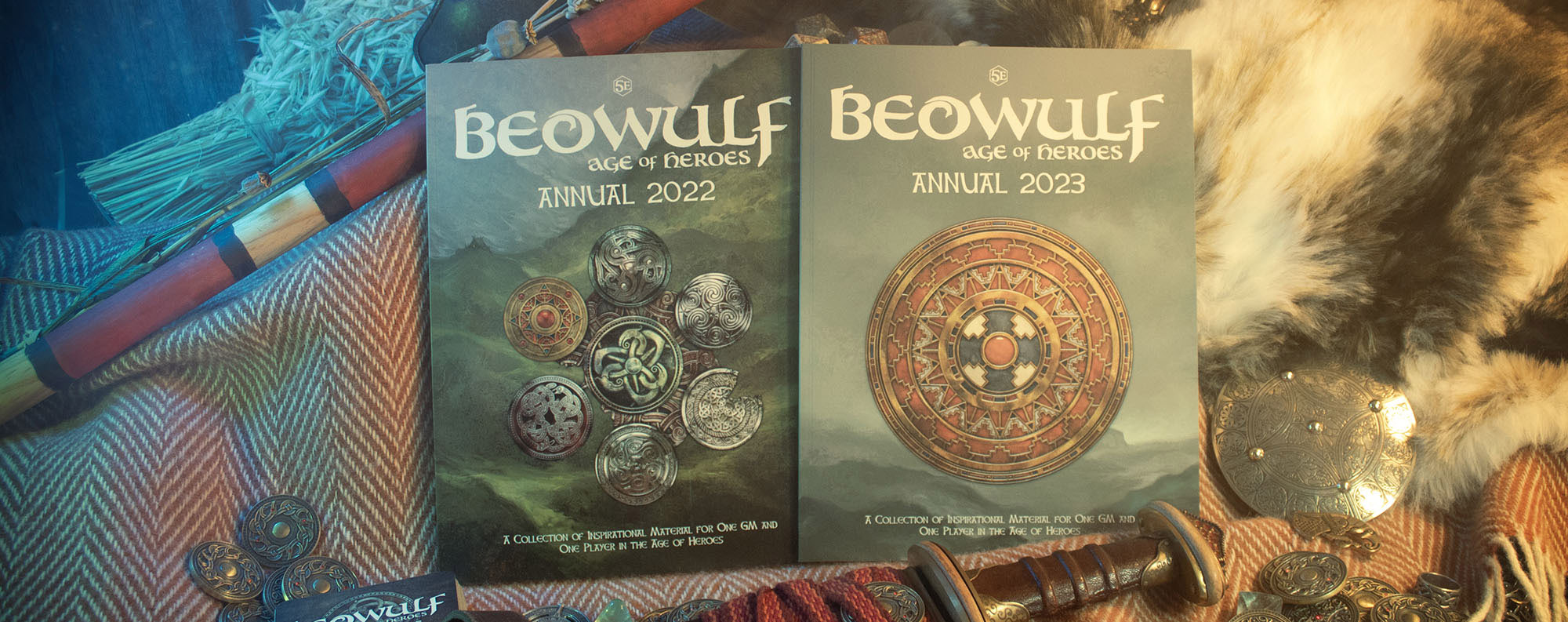
Gareth Hanrahan wrote The Triple Serpent, one of the BEOWULF: Age of Heroes adventures featured in Trials of the Twin Seas. We’re going to ask him a few questions about that process.
Handiwork Games (HW): You’re a famous writer, both in the tabletop roleplaying industry and now in the wider world of fantasy fiction, is there anything on your bucket list that you haven’t yet had the chance to work on?
Gareth Hanrahan (GH): “Famous” is not the word I’d use. “Doggedly mid-list but still kicking” is more accurate. I think I’ve checked off most of my beloved properties, but there’s still lots of new stuff to be made, or old stuff to be perfected.
HW: The adventure is set in Ireland, after the time of St Patrick as the Age of Heroes is coming to an end, at least there. Was there something particular about that transitional time that appeals to you?
GH: My initial thought was ‘oh, I’ll do something in Ireland. I’m Irish, and it’ll give me a chance to mess about with Irish myth.’ And that brings you right to the Colloquy of the Ancients, which is this sort of framing story for the tales of the Fianna, these mythic heroes of Ancient Ireland. In the Colloquy, two aged heroes travel around with St. Patrick, telling him of the days of old – so the theme of the embers of the Age of Heroes is right there in the text. And that plugged right into some of the themes of the Beowulf game, with the tension between the Old Ways and the Church.
More generally, I find myself drawn to aftermaths and marginalia. I don’t know if I trained my brain that way by spending too long writing for licensed games – when you’re doing stuff set in Middle-earth, or Babylon 5 or whatever, where there’s a Big Story at the heart of the world, you find yourself looking for the small stuff in the interstices, or in the years just before or after the big canonical events – or if I just naturally think that way, and that’s why I ended up working on so much licensed stuff.
HW: When you’re writing a project like this, do you rely on an outline or is it more stream of consciousness? Is working on fiction different for you?
GH: Roleplaying game scenarios have to _work_ – at least, that’s my starting point. Regardless of how clever or poetic you want to be, you know that the scenario has to be playable in a few hours, that it tells the players who the important characters/places/events are, that it gives them clear choices that affect the story. It needs to present the information in a way that the GM can digest easily; it needs to allow for different player characters and anticipate their likely actions and reactions while still being flexible enough for the GM to respond to unexpected stuff on the fly. Ultimately, a scenario is a roadmap and a toolkit and a list of cool suggestions for the GM to use or ignore as needed. So, anyway, hitting all those requirements – an intriguing initial setup, clear communication of situation and options, a selection of branching choice, tools and suggestions for the GM – gives a sort of inevitable structure to a scenario. Also, RPG writing – the actual prose – has to be functional first, too. Even if you’re writing it stream-of-consciousness, you’re still writing it for someone else – the GM – to read and put to use.Fiction has much less internal rigour. There are best practises and common formulae, but you don’t *have* to use them. You’ve got to hold the reader’s attention, to entertain them, and to push them towards an emotional response. How you do that doesn’t matter, as long as you succeed in doing so. But there, I find I need at least some measure of structural planning or I just sink into mush.
HW: Was there anything that you didn’t plan for that “showed up anyways”? Any unexpected deviations from your plans?
GH: More than there were unexpected conformities with my desires – the myth of the Hag of the Finger comes complete with a monster that has a weak spot, the colloquy of the Ancients gave me pretty much all the key non-player characters. It’s an experience I’ve had before with other projects – you start writing, and the history conspires to provide you with supporting material.
HW: Do you have any advice for a player about to take on this adventure, or for a GM about to run it?
GH: For players… oh, be pure of heart, strong of limb, and match your actions to your boasts. Players have it easy.
For GMs, and here we get into SPOILER territory. The identity of the villain of the piece isn’t fixed – there are three possible candidates. This gives you a lot of flexibility. If you’re running the game as a one-shot, then pick the villain based on the events of the game – let the player’s guesses and deductions and the way the scenes get played out dictate who’s really behind the monster. However, if you’re running this as the end of a Beowulf campaign – if you’ve played through the other published scenarios and this is going to be the elegiac end to your Hero – then you’re probably best served by picking the villain to fit with the overall arc of your campaign. For example, if your Hero’s been struggling against the Church the whole time, then maybe you want to give them a final victory by unmasking the Abbot as the villain. Look to end on a satisfying, poetic note as your hero sails off into the sunset…
The Triple Serpent will be one of the adventures featured in The Trials of the Twin Seas, a full-colour hardcover collection of our BEOWULF adventures. Sign up for the forthcoming Kickstarter here!

